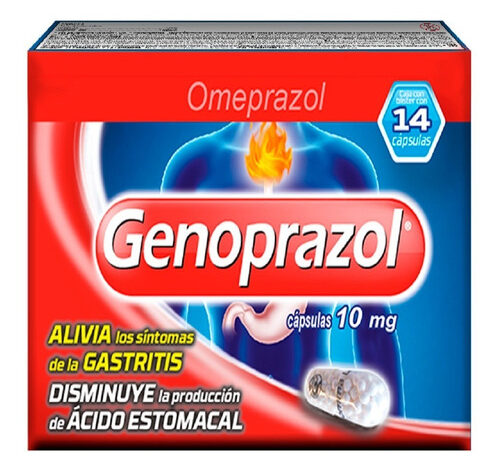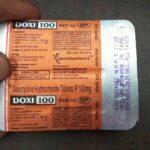Genoprazol: Side Effects, Dosage, Uses, and Review

Genoprazol is a Mexican brand of omeprazole, a medication used alone or with other medications to treat the symptoms of gastroesophageal reflux disease (GERD), a condition in which backward flow of acid from the stomach causes heartburn and possible injury of the esophagus (the tube between the throat and stomach) in adults and children 1 year of age and older.
Heartburn is a very common symptom caused by acid reflux. Genoprazol may help your stomach symptoms related to acid, but you could still have serious stomach problems. This drug is also used as a treatment of other conditions such as the management of erosive esophagitis (inflammation in the esophagus), and hypersecretory conditions (conditions where your stomach makes too much acid). This drug is also used to treat stomach infections caused by the bacteria Helicobacter pylori.
.
How does Genoprazol work?
Genoprazol is a PPI. Proton pumps are also called hydrogen-potassium pumps, and they are located along the inner lining of the stomach. These pumps are responsible for releasing acid into the stomach.
PPIs such as Genoprazol will block the release of acid, thus decreasing the acidity inside the stomach. Genoprazol takes around 1 hour to block the production of stomach acid, and its maximal effect occurs around 2 hours after taking the pill. The action of omeprazole can continue for about 3 days.
How is Genoprazol taken?
Omeprazole is available in three dosage types. The following table lists the dosing instructions for each use of Genoprazol.
| Use | Dosing instructions | Frequency of use |
| intestinal ulcers in adults | 20 mg once daily | 4 weeks, but some people may require a total of 8 weeks |
| H. pylori infections, along with 2 antibiotics | 20 mg twice daily along with 2 antibiotics | 10 days |
| H. pylori infections, along with 1 antibiotic | 40 mg once daily along with 1 antibiotic | 14 days |
| stomach ulcers in adults | 40 mg once daily | 4–8 weeks |
| GERD in people aged 1 and above | 20 mg once daily | 4–8 weeks |
| maintain healing of erosive esophagitis in people aged 1 and above | 20 mg once daily | studies have not explored its use past 12 months |
| Zollinger–Ellison syndrome | 60 mg once daily | some people with this condition have used omeprazole continuously for more than 5 years |
| maintain healing of erosive esophagitis in people aged 1 and above | 5–9 kg: 5 mg 10–19 kg: 10 mg 20 kg or greater: 20 mg | once daily |
Researchers have not conducted studies on the efficacy of omeprazole past 12 months.
Doctors suggest taking Genoprazol 30–60 minutes before a meal. If the doctor recommends taking Genoprazol twice daily, the person should take it before breakfast and before supper.
What are the side effects of Genoprazol?
Genoprazol may cause side effects. Tell your doctor if any of these symptoms are severe or do not go away:
• constipation
• gas
• nausea
• diarrhea
• vomiting
• headache
Some side effects can be serious. If you experience any of these symptoms, call your doctor immediately, or get emergency medical help:
• rash
• hives
• itching
• swelling of the face, throat, tongue, lips, eyes, hands, feet, ankles, or lower legs
• difficulty breathing or swallowing
• hoarseness
• irregular, fast, or pounding heartbeat
• excessive tiredness
• dizziness
• lightheadedness
• muscle spasms, cramps, or weakness
• jitteriness
• uncontrollable shaking of a part of the body
• seizures
• severe diarrhea with watery stools, stomach pain, or fever that does not go away
• rash on cheeks or arms that is sensitive to sunlight
• increased or decreased urination, blood in urine, fatigue, nausea, loss of appetite, fever, rash, or joint pain
People who take proton pump inhibitors such as Genoprazol may be more likely to fracture their wrists, hips, or spine than people who do not take one of these medications. People who take proton pump inhibitors may also develop fundic gland polyps (a type of growth on the stomach lining). These risks are highest in people who take high doses of one of these medications or take them for one year or longer. Talk to your doctor about the risk of taking omeprazole.
Genoprazol may cause other side effects. Call your doctor if you have any unusual problems while taking this medication.





